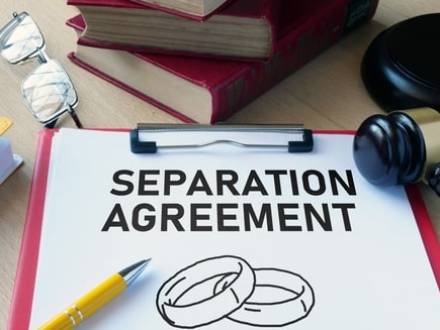Wheaton |
St. Charles |
Sycamore
 630-665-7300
630-665-7300
Legal Separation vs. Divorce in Illinois
 While legal separation and divorce are both legal processes that share similar procedures, their outcomes are distinctly different. A divorce ends the marriage, while legal separation does not. A legal separation is more than just physical separation between a couple, although physical separation is certainly a part of it.
While legal separation and divorce are both legal processes that share similar procedures, their outcomes are distinctly different. A divorce ends the marriage, while legal separation does not. A legal separation is more than just physical separation between a couple, although physical separation is certainly a part of it.
Some couples may choose legal separation over divorce for a number of reasons, but in many cases, a legal separation ultimately results in divorce. If you are contemplating legal separation in Illinois, discuss the matter with an experienced St. Charles, IL divorce lawyer before making your decision.
What Are Some of the Most Common Reasons for Choosing Legal Separation?
Legal separation is a court-approved agreement between spouses to live separately from one another, financially and physically. Spouses are not free to remarry during a legal separation, and spousal inheritance laws remain intact during a legal separation. The most common reasons spouses choose legal separation include:
Legal Separation as a "Trial-Run" for Divorce
Many couples view legal separation as an opportunity to reassess their feelings for their spouse and determine whether divorce is truly what they want. Once the couple is living separately, they have the opportunity to experience what divorce life will entail and what it will feel like. In most cases, legal separation involves splitting parenting time, allowing each parent to see firsthand how divorce will affect the children and their relationships with them.
Religion as a Reason to Choose Legal Separation
For some couples, religious beliefs keep them from filing for divorce, so they choose legal separation instead. A legal separation allows a couple to physically and financially separate from each other without disregarding religious beliefs. A couple who has deep religious beliefs could decide to stay legally separated indefinitely, although they would not be free to remarry another while legally separated.
Legal Separation to Maintain Health Insurance
Health insurance is a major issue in today’s world. Medical treatments are incredibly expensive, and unless a spouse qualifies under the Affordable Care Act or can otherwise afford to pay for private health insurance, staying on a spouse’s work insurance can be a necessity. Older spouses may choose legal separation as a way to maintain healthcare coverage until they are old enough to qualify for Medicare coverage.
Legal Separation for Other Financial Benefits
There may be tax benefits or Social Security Benefits to remaining married. Spousal support can be awarded in a legal separation, and some couples will split assets under the equitable distribution laws of Illinois. Couples who are using a legal separation as a trial run may choose not to split assets until they decide to divorce, although this would not be a good choice if there is a lack of financial trust between the spouses.
How Do You File for Legal Separation in Illinois?
You must physically and financially live separately to become legally separated. While this usually means that a couple resides in separate houses, the court understands that not every couple has the financial means to afford separate residences during the legal separation. Spouses could have separate bedrooms and live separate lives in the same home.
At least one spouse must have resided in Illinois for the past 90 days. Legal separation is filed in the same manner as a divorce. The person filing for legal separation cannot be at fault; however, this is rarely an issue, as Illinois is a no-fault state. Couples may file joint income tax returns while legally separated, but not after a divorce is final.
Contact a Kane County, IL Divorce Lawyer
Before you decide to become legally separated, take the time to have a discussion with your spouse. St. Charles, IL divorce attorney from Mirabella, Kincaid, Frederick & Mirabella, LLC. Our experienced attorneys can advise you on whether a legal separation will provide any real benefits over a divorce. MKFM Law serves family law clients at its offices in Kane County, DuPage County, and DeKalb County. To schedule an initial attorney meeting, call 630-665-7300.


 Read More
Read More





